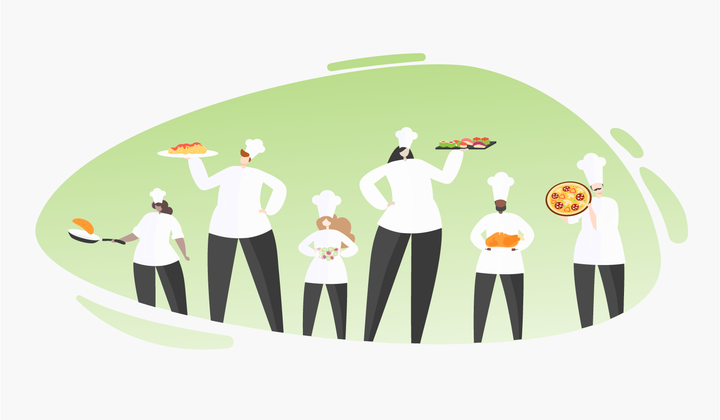In this post
How to Become a Chef in Australia: Complete Guide for 2025

This is your handbook to becoming a chef in Australia. Learn how to get your start with a course in culinary arts and make it in the hospitality industry with this in-depth guide.
Food has risen to an art form in Australia, taking chefs along the ride to fame and glory.
Always loved cooking? If you’ve got a bit of a flair for flavour, you might have imagined yourself at the helm of your own kitchen, artfully garnishing a plate with one hand and balancing a flaming wok with the other.
A career as a chef can open many doors. The hospitality industry in Australia is always growing, and the career opportunities on offer can take you anywhere. From an upscale resort in far-north Queensland to a winery in South Australia or a tiny laneway in inner Melbourne: the world is your freshly-shucked, locally sourced oyster.
But beneath a chef’s passion and creativity there lies dedication and an extraordinary amount of hard work. So how do you get from being handy in the kitchen to a darling of the culinary world?
If you’re just starting to explore the idea of a culinary career, you may need to field some important questions first, like:
- What kind of work will I do in the kitchen?
- How much does a chef earn in Australia?
- Are chefs in demand in Australia?
- What qualifications do you need to become a chef?
- How long does it take to become a chef?
- What are the chef rankings?
- What other types of culinary jobs are there?
Today, we’ll cover all these questions and more. This comprehensive guide to becoming a chef will take you from the research and discovery phase, through to concrete next steps for starting out in the industry.
In this complete guide, we’ll brief you in five chapters.
Let’s get cooking.
WHAT DO CHEFS DO EVERY DAY?
Get an idea of what it is, exactly, that chefs do in their day-to-day work, job prospects, and how much they get paid.
IS BEING A CHEF RIGHT FOR YOU?
Find out what it’s really like being a chef, and decide whether it’s a good fit for you.
WHAT IS THE CHEF RANKING SYSTEM?
Chef rankings, the kitchen hierarchy, what now? Time to finally find out what a Sous Chef is. (It has nothing to do with soup.)
CULINARY QUALIFICATIONS
Get the low-down on what qualifications and training you’ll need to become a professional chef.
CHEF APPRENTICESHIPS
Why chef apprenticeships are the best pathway into the industry, and how to get one.
But First: What Does the Word ‘Chef’ Really Mean?
A chef is a professional cook who oversees food preparation and manages all aspects of a kitchen, including the other cooks. The word ‘chef’ comes from the French phrase ‘chef de cuisine’, which means the ‘boss of the kitchen’.
In Australia, the word ‘chef’ is sometimes used to refer to a professional cook; confusingly, it’s also sometimes used to refer to a head chef or chef-manager.
Chefs are trained through formal qualifications or an apprenticeship, and usually have several years of experience as a cook. As they gain expertise, chefs will master a broad range of techniques in all areas of cookery, and often specialise in a particular cuisine. Chefs most commonly work in commercial kitchens such as restaurants or catering companies, but they can also be found in private households and institutions like schools and hospitals.
CHAPTER 1
What Do Chefs Do?
A chef is more than a cook – they don’t just cook food, they make it possible for an entire restaurant to function. Depending on the chef’s level of seniority, they can be responsible for an entire process of creating dishes, from researching and planning a menu to sourcing produce, organising the kitchen, designing the presentation of each dish. Some chefs are in charge of a particular section, such as desserts or soups, according to the kitchen hierarchy.
Chef Duties
- Cooking and preparing food
- Developing a menu
- Estimating the costs of each meal
- Purchasing ingredients
- Hiring and training staff
- Demonstrating cooking techniques and procedures
- Maintaining hygiene standards
- Designing an efficient kitchen workflow
- Supervising other cooks and kitchen staff
- Using and maintaining kitchen equipment
Job Prospects are Strong & Getting Stronger
Australia has a huge hospitality industry, and it’s growing all the time. Over the past 5 years, demand for chefs has skyrocketed, and the Australian Government predicts strong growth, with another 81,000 job openings over the next 5 years.
How much does a chef earn in Australia?
The average salary for a chef varies greatly, depending on their position in the kitchen hierarchy, but a typical salary across all roles lies between $60,000-$70,000.
So what does this mean? Cooking is a moderately-paying career path, and most people get into it because it gives them great creative satisfaction, variety, and excitement.
$64,132
Typical Chef Salary
How did we arrive at this number?
Seek averages out data from job postings, estimating a typical chef’s salary at $60-70K.
According to Payscale, full-time kitchen chefs (a lower ranking cook) usually make around $53,962 per year, whereas an executive chef typically earns $84,178, and up to $107,000 on the higher end of the scale.
CHAPTER 2
Is Being a Chef Right For You?
The hospitality industry can be tough, and it takes a particular kind of person to flourish in the heat of the kitchen. But if you happen to be that kind of person, you may find yourself madly in love with your career.
Not many jobs can provide the level of excitement and challenge that a career as a chef can. No two days in the kitchen are the same, with creativity and problem-solving skills required in equal measure.
So is a career in the culinary arts right for you?
Try Working in a Kitchen First
Before you go to culinary school, before you apply for an apprenticeship, before you decide that cooking is the love of your life… work as a kitchen hand for a while.
Seriously, work in a kitchen.
It’s the only way to get a feel for what being a chef is really like. Being a kitchen hand is fast-paced, physically challenging work, as you’re essentially the support role that makes sure everyone else can do their job properly. In this role, you’ll get to know fairly quickly whether you absolutely thrive or wilt in the kitchen environment. That way, if you choose a foray into the culinary world, it will be based on true, grounded love for cooking rather than illusions.
Find a restaurant that you connect with in some way, with an ethos or cuisine that excites you, and start working at the bottom of the ladder.
You
- Calm under pressure
- Attention to detail
- Passionate and creative
- Mentally tough and driven
- High physical energy and stamina
- Enjoy working with others
Skills
- Cooking expertise
- Business savvy
- Highly developed palate
- Organisational skills
- Food safety
- Managing people
- Culinary knowledge
- Problem-solving
Activities
- Organising, planning, and prioritising your work
- Using your hands to move & manipulate objects
- Forming good relationships with people
- Coaching, teaching, and developing people
- Creative thinking
- Thinking on your feet & problem-solving
People call me for advice about their kids who want to go into cooking, and I always tell them, “You know, the kid should work in a restaurant as a dishwasher, waiter, cook, whatever, to get the taste and essence of that thing that may seem glorious from the outside.”
What is Life in the Kitchen Like?
Once you’ve worked in a kitchen for a while, you will start to realise some things about professional cooking.
Long hours
Being a chef is not a 9 to 5 job. Head chefs, in particular, are famous for regularly working 12-hour shifts to accommodate morning deliveries, afternoon preparation, and lunch and dinner services. It’s not uncommon for cooks and kitchen staff at all levels to work long hours. Kitchens open long before dinner is served, and close long after.
Close-knit
Because you’re working so closely with the other staff, they will become like family to you. A working kitchen is like a well-oiled machine. Everyone has their part to play, and high-pressure environments forge strong friendships. This is not a job for lone-wolf types.
Fast-paced
The kitchen can be a hectic place during food service. You’ll need to be quick on your feet with good spatial awareness to move around the others working near your space and. If you thrive in busy environments, you’ll love this.
Hands-on
Cooking for a living is not for the faint of heart. You must be able to handle lots of physically demanding, high-pressure work, and keep your cool around very hot cooktops. On the other hand, if you prefer physical work and you’ve always dreaded the thought of a cubicle, hands-on work like this could be very satisfying.
Ben’s Career Journey: From Chef to Sustainable Food Educator
Meet a professional chef whose path led him through some of Australia and New Zealand’s top kitchens – and to create a game-changing social enterprise that seeks to reinvent the way we think about food. Dive deeper and find out where a career in the culinary arts can take you.
CHAPTER 3
Chef Rankings and the Kitchen Hierarchy
The hierarchy most commonly seen in kitchens is a legacy from the french ‘brigade’ system. We break it down and show you the average duties and salaries for each position.
When you start off working in a kitchen, it’s most likely your first job will be as a kitchen hand – a job which mostly involves cleaning and assisting everyone else in the kitchen. As you gain experience and skills, you will start moving up the ranks.
The chef ranking system can be confusing at first, but once you get to grips with the way the kitchen works, it will start to make sense. The different rankings of chef are listed here from highest to lowest.
1. Executive Chef
$84,178
TYPICAL SALARY
$56k – $107k
Executive Chef duties:
(sometimes aka Chef/Owner)
- May own restaurant
- May manage several restaurants
- Develop menu direction
- Supervise food preparation
- Share knowledge and train kitchen staff
- Assign responsibilities for food preparation to cooks
- Deal with complaints and customer feedback
- Prepare food alongside other chefs
- Manage all food and beverage operations
2. Head Chef
$66,343
TYPICAL SALARY
$52k – $82k
Head Chef duties:
(aka Chef de Cuisine)
- Specialise in one type of cuisine
- Manage kitchen operations
- Prepare, cook, and present food
- Planning the menu
- Inventory and purchasing
- Budget management
- Manage and train kitchen employees
- Oversee hygiene and sanitation standards
3. Sous Chef
$61,130
TYPICAL SALARY
$51k – $70k
Sous Chef duties:
(aka Second-in-Command)
- Manage day-to-day operations of the kitchen
- Manage, direct and discipline kitchen staff
- Oversee quality control
- Assisting with creative menu development
- Manage daily food inventory and costs
- Generate business reports
- Deal with suppliers
- Substitute for the head chef or other chefs when needed
- Help with daily food preparation
4. Chef de Partie
$56,365
TYPICAL SALARY
$46 – 60k
Chef de Partie duties:
(aka Line Chef or Station Chef)
- Responsible for preparing one type of food
- Season and cook elements of each dish
- Garnish and present dishes for serving
- Operate kitchen equipment and appliances
- Monitor cleanliness and sanitise kitchen areas
- Taste and keep records of food products
5. Kitchen Chef
$24.13/hr
TYPICAL SALARY
$18 – $27/hr
Kitchen Chef duties:
- Help to plan menu
- Prepare salads, sandwiches, stuffings, sauces
- Cutting up vegetables, fruits, and meats
- Plate up and garnish meals
- Supervise kitchen assistants and waiters
- Ordering and bookkeeping
6. Chef Assistant
$22.44/hr
TYPICAL SALARY
Range: $16 – $26/hr
Chef Assistant duties:
- Ordering and inventory of supplies
- Clean and maintain kitchen, including appliances, tools and equipment, and storage areas
- Estimate type and quantity of food items to order for daily service and functions
- Basic ingredient preparation, such as chopping and pre-cooking
7. Kitchen Hand
$19.94/hr
TYPICAL SALARY
Range: $15-$24/hr
Kitchen Hand duties:
- Cleaning dishes, cookware, and utensils
- Sweeping and mopping
- Clearing tables and bringing dirty dishes to the kitchen
- Maintaining a clean kitchen
- Helping with station setup for cooks
- Helping with basic food preparation, such as washing and chopping ingredients
- Laundering linens
The Chef Hierarchy: Who is Who in the Kitchen?
Let this article be your guide to the chef ranking system, or the kitchen brigade system as it is sometimes known. Go into more detail on the different kinds of roles and explain how the system helps a kitchen run efficiently so you can be prepared for your first shift.
CHAPTER 4
Culinary Qualifications
The type of qualification you should pursue depends on what kind of chef you want to become. Getting qualified can take anywhere from 6 months to 3 years, but you’ll need at minimum a Certificate III in Culinary Arts to work professionally.
Working in a restaurant is not the only path available to you as a chef. It’s worth considering other routes such as baking or patisserie, both of which are experiencing a boom and urgently in need of skilled, talented people to fill the workforce gaps.
Necessary
You will need, at minimum, to have completed one of these qualifications to become a chef in Australia:
- Chef – Certificate III, IV or Diploma in Commercial Cookery (SIT30813)
- Pastry chef – Certificate III, IV, or Diploma in Patisserie (SIT31016)
- Baker – Certificate III in Retail Baking (Bread) (FDF30610)
Recommended
It’s also highly recommended to gain your qualification through an apprenticeship, as cookery is an extremely hands-on profession. You’ll get a much better start through learning on the job, working your way up, and gaining industry contacts as you go. To gain an apprenticeship, you will usually need to have completed at least Year 10 or equivalent.
It’s also usually a good idea to gain your VCE or equivalent. Since your job will involve a lot of business and communication skills, as well as calculating cooking temperatures and quantities, you’ll need strong mathematics and English skills.
How to Become a Baker
Are you interested in the field of baking but you’re not sure where to start? Learn about what being a baker is like, what skills and qualities you’ll need to succeed, and how to get started in the industry.
CHAPTER 5
Should You Take on a Chef Apprenticeship?
While you don’t have to complete an apprenticeship to become a chef, it’s a smart move – and will greatly improve your chances of starting out on the right foot. You’ll be able to gain work experience while you complete your qualification, all while getting paid.
How a Chef Apprenticeship Can Benefit Your Career
Learn what’s involved in a chef apprenticeship in Australia, what to expect while you’re working. Read the article to discover why it’s the best way to get started in the industry.
Your culinary adventures await.
So, you’ve had a taste of being a chef – and you’ve decided it’s the perfect path for you. What are you waiting for? Start making a wishlist of kitchens nearby (and further afield!) you’d like to work in and explore the qualifications available to you.
Browse Results
Diploma of Nutrition 10967NAT
The 10967NAT Diploma of Nutrition prepares you with the skills and experience to take on a variety of nutrition advisory roles across multiple environments and settings.
Fast-Track Personal Training Course SIS40221
Are you passionate about helping people reach their health and fitness goals? Get on the fast-track to becoming qualified as a Personal Trainer with AIPT. Create a career you can take anywhere, and be your own boss Become a Personal Trainer quicker wit...
Diploma of Sport, Aquatics and Recreation Management SIS50122
Turn your business acumen and passion for sports into a career with the Diploma of Sport, Aquatics and Recreation Management. If you have a passion for sports and a strong head for business, the SIS50122 Diploma of Sport, Aquatics and Recreation Manage...
Complete Personal Training Course SIS30321,SIS40221
The Complete Personal Training Course is perfect for getting your fitness career off the ground. You will graduate with not one but TWO nationally recognised qualifications and gain the best of both worlds. Delivered with hands-on, practical learning t...
Complete Personal Training & Nutrition Course SIS30321,SIS40221
Passionate about promoting healthy living through physical fitness and nutrition? AIPT has the perfect course package that will qualify you to do both. The Complete Personal Training & Nutrition Course will propel you into your new career with The...
Double Diploma of Business + Leadership & Management BSB50120,BSB50420
CAL’s Double Diploma of Business and Leadership & Management will give you the skills you need to manage business resources and operations in a business of any size. You’ll learn essential business skills in budgeting and finance, identifying marke...
Complete Personal Training & Business Course SIS30321,SIS40221
AIPT has the perfect course to start your personal training business and hit the ground running with TWO nationally-recognised fitness qualifications – SIS30321 Certificate III & SIS40221 Certificate IV in Fitness – and access to The BSB50120 Diplo...
Certificate IV in Fitness SIS40221
Whether you want to work in a gym environment or aspire to run your own personal training business, becoming a qualified Personal Trainer is rewarding, giving you the opportunity to help people reach their health and fitness goals.
Certificate III in Sport, Aquatics and Recreation SIS30122
The SIS30122 Certificate III in Sport, Aquatics and Recreation will equip you with the tools and knowledge you need to take on operational and customer support positions in the sport or community recreation industry. This hands-on qualification will eq...
Certificate III in Fitness SIS30321
If you are passionate about planning and delivering exercise programs that help clients reach their health and fitness goals, becoming a nationally qualified Group Exercise Instructor and Gym Instructor is for you.
IT Service Management Professional (ITIL @ 4)
Digital transformation has altered the IT landscape significantly in the past years. IT service management (ITSM) helps all organisations, regardless of the industry or business sector, provide IT services using the most efficient and economical method...
Diploma of Information Technology (Cyber Security) ICT50220
Cyber security engineers are in high demand all over the world as organisations continue their journeys towards digital transformation. The ICT50220 Diploma of Information Technology (Cyber Security) will provide foundational skills for aspiring cyber...
Diploma of Information Technology (Back End Web Development) ICT50220
Our ICT50220 Diploma of Information Technology (Back End Web Development) will provide foundational skills for aspiring web and application developers to create websites and applications for organisations to leverage opportunities in e-commerce and the...
Diploma of Information Technology (Advanced Networking) ICT50220
Our ICT50220 Diploma of Information Technology (Advanced Networking) will provide foundational skills for aspiring network engineers in setting up and managing complex network environments in organisations, as well as preparing for and responding to cy...
Diploma of Social Media Marketing 10904NAT
Looking to tap into the exciting world of social media? The 10904NAT – Diploma of Social Media Marketing is a qualification that offers a jump start to a career in this field. If you want to know how to become a social media manager or improve yo...
Certificate IV in Business (Administration) BSB40120
Are you looking to expand your business administration skills? Our BSB40120 – Certificate IV in Business (Administration) is a qualification that can get you up to speed if you’re looking for a promotion in this specialisation. If you...
Certificate III in Business (Administration) BSB30120
Elevate Your Career with Career-Focused Units If you’re eager to embark on a career in business administration and require the latest skills and knowledge, the BSB30120 – Certificate III in Business Administration (Release 2) is your perfec...
Certificate III in Business BSB30120
Ready to Get Job Ready? Enrol in Upskilled’s BSB30120 – Certificate III in Business today and take the first step towards a successful career in business administration. Our course is designed to provide you with the skills and knowledge ne...
Certificate in III Information Technology Focus on Basic Cloud Computing ICT30120
If you want to learn the basics of cloud computing but are also keen to explore the general areas of ICT, our ICT30120 – Certificate III in Information Technology – Focus on Basic Cloud Computing is a great foundational course if you have l...
Cyber Security Governance, Risk and Compliance Professional
Master the Fundamentals of Cyber Security Governance, Risk, and Compliance Launch your career in high-demand cyber security with a focus on Governance, Risk and Compliance (GRC). This comprehensive course is designed to equip participants with the know...
Online courses also available
Latest Articles
Agriculture Careers: What You Should Know in 2025
As one of Australia's most important industries, the agriculture industry offers great career opport...
Are Digital Skills the Key to Job Security in 2025?
The digital revolution is here, and it doesn’t care if you have a technical job or not — it’s coming...
How to Become a Chef in Australia: Complete Guide for 2025
The complete guide to becoming a chef in Australia. Learn how to get your start and make it in the h...
Want to read more?
How to Become a Virtual Assistant | The Ultimate Guide
Would you like to work remotely? Do you like the idea of having your own business? Would you like th...
How to Become a Translator
Do you have strong language skills? Work with your mother tongue and another language as a professio...
How Technology is Affecting Career Choices (Infographic)
Technology is changing the way we work and affecting future career choices, see what areas are growi...







